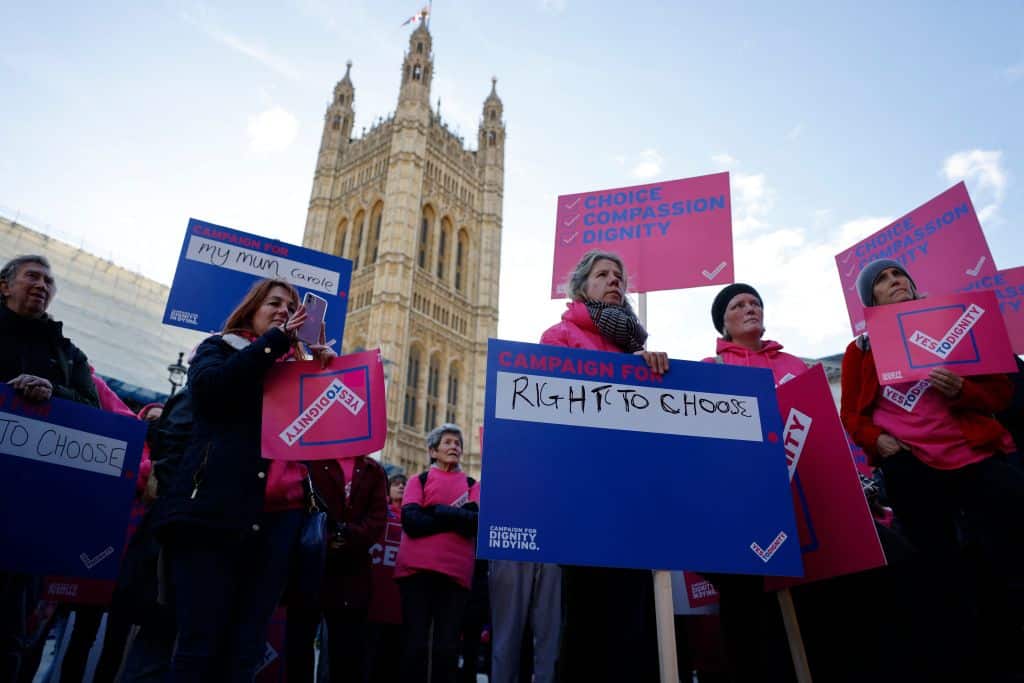The Terminally Ill Adults (End of Life) Bill faces a counter move by a group of cross-party MPs to have the controversial proposal binned before it can be voted on by UK lawmakers.
On Friday, 29 November, the UK Parliament is scheduled to vote on the Private Members’ Bill, proposed by Labour MP Kim Leadbeater, to legalise assisted suicide/dying for terminally ill adults.
But Ben Spencer, a Conservative MP; Munira Wilson, a Liberal Democrat; and Labour’s Anna Dixon have co-sponsored a so-called "wrecking amendment" that could stop the Bill in its tracks if enough MPs support it, <a href="https://www.telegraph.co.uk/politics/2024/11/26/assisted-dying-bill-could-be-scrapped-before-vote/"><mark style="background-color:rgba(0, 0, 0, 0)" class="has-inline-color has-vivid-cyan-blue-color">reports</mark></a> the <em>Daily Telegraph</em>.
The rearguard action comes amid widespread concerns among politicians that such a significant change to the law and British society has not being given adequate time in the Commons to be debated and discussed before the vote.
Because it is a Private Member’s Bill, there is a more limited assessment and analysis of its contents compared to other types of governmental bills, with the provisions of this Bill only being made public just over two weeks ago.
Had the government – as opposed to a private member – sponsored the bill, the assessing apparatus of the State could have kicked in. Whitehall could conduct impact assessment or widespread consultations with those involved or affected by such a change in the law, such as GPs, palliative care specialists, judges and representatives for the disabled or terminally ill patients – an investigative process that would take much longer than the far smaller timeframe within which Leadbeater's legislation has progressed.
<a href="https://catholicherald.co.uk/prof-john-keown-the-assisted-suicide-bill-is-incoherent-unworkable-and-dangerous/?swcfpc=1"><mark style="background-color:rgba(0, 0, 0, 0)" class="has-inline-color has-vivid-cyan-blue-color"><em><strong>RELATED: Prof John Keown: The assisted suicide Bill is incoherent, unworkable and dangerous</strong></em></mark></a>
If the proposed "wrecking" amendment is granted a hearing by the Speaker of the House, the amendment will be voted on during the second reading of Ms Leadbeater’s Bill on 29 November, but before a vote on the Bill takes place. If the proposed amendment secures majority support from MPs, that would prevent the Bill from proceeding to a vote, the <em>Telegraph</em> explains.
The amendment reads: “This House declines to give a Second Reading to the Terminally Ill Adults (End of Life) Bill because the House’s procedures for the consideration of Private Members’ Bills do not allow for sufficient debate on and scrutiny of a Bill on a matter of this importance.”
It adds that the House “recognises the importance of having a fully-informed debate and vote on assisted dying, which should be subsequent to an independent review of and public consultation on the existing law and proposals for change; and considers that the review and consultation should be informed by an independent assessment of the provision of palliative care for adults who are terminally ill”.
Both politicians and leaders from the Catholic Church and other churches have spoken out about how the Bill, if it becomes law, would have a negative impact on palliative care provisions in the country.
Cardinal Vincent Nichols has recently <a href="https://catholicherald.co.uk/faith-leaders-unite-against-assisted-suicide-bill/"><mark style="background-color:rgba(0, 0, 0, 0)" class="has-inline-color has-vivid-cyan-blue-color">signed a joint letter</mark></a> with the UK’s religious leaders opposing the assisted suicide Bill.
“We believe that a truly compassionate response to the end of life lies in the provision of high-quality palliative care services to all who need them," the letter states.
“While there are many examples of excellent palliative care in this country, it remains worryingly underfunded.
“Investment in palliative care is the policy of a truly compassionate nation. It is the way to ensure that everyone in society, including the most vulnerable, receive the care they deserve at the end of life.”
In response to the proposed amendment by the group of cross-party MPs, Ms Leadbeater has said that “the selection of amendments is entirely a matter for the Speaker, but it’s clear that the amendment in question is intended to prevent this vital issue being debated at all”.
She adds: “I believe Parliament would be failing in its duty if it did not take this opportunity to address a reform that is long overdue and has overwhelming public support.
“As the Leader of the House, Lucy Powell, has said, my Private Members’ Bill will have at least as much time for debate and scrutiny as any other piece of legislation. I look forward to starting that process with a respectful and compassionate debate on Friday.”
The <em>Telegraph</em> notes the comments of two of the MPs proposing the amendment, which address the collective concerns around there not being sufficient time to consider Ms Leadbeater's Bill and the full range of its implications.
Ms Wilson, the MP for Twickenham, says: “It’s absolutely right that Parliament should debate and consider proposals to legalise assisted dying in certain cases – on grounds of compassion and personal autonomy.
“However, the speed with which this Bill has been brought forward, without any pre-legislative scrutiny and consultation, and given the limited time for debate and proper scrutiny through the Private Members’ Bill process, means parliamentarians are having to take a monumental decision in a totally inadequate way.
“There are still huge questions to be answered around how the proposals would be implemented in an overstretched NHS and court system, the inequalities it could create and the legal challenges that would likely result from the legislation as it is drawn up.”
Dr Spencer, the MP for Runnymede and Weybridge, says: “Irrespective of one’s view on the rights and wrongs of assisted dying legislation, this area should be scrutinised and debated properly prior to a vote in Parliament.
“There have been concerns raised from a range of professionals, including judges and medics, around the provisions of the Bill, and that this is being rushed through.
“This amendment calls for the groundwork to be done first, including legal review, consultation and assessment of palliative care provision, so that Parliament can have a properly-informed debate and vote on assisted dying.
“While I strongly support the principle of bodily autonomy of people with full decision-making capacity, I have substantial concerns about this Bill.”
Addressing procedural concerns should the Bill become law, Lord Thomas of Cwmgiedd, a former Lord Chief Justice between 2013 and 2017, told <em>BBC Radio 4’s</em> "Today" programme that “no-one has grappled with the detail” of the impact that assisted dying legislation could have on the UK's court system. <br><br>“It seems to me that the one really difficult question that hasn’t been addressed in this is how is the judge to proceed, as it cannot possibly be a rubber-stamping exercise," Lord Thomas says.
<a href="https://catholicherald.co.uk/judicial-safeguards-for-assisted-suicide-cant-be-trusted-says-father-of-baby-left-to-die-by-court/"><mark style="background-color:rgba(0, 0, 0, 0)" class="has-inline-color has-vivid-cyan-blue-color"><em><strong>RELATED: Judicial ‘safeguards’ of assisted suicide Bill are worthless, says father of baby abandoned by courts</strong></em></mark></a>
The <em>Telegraph</em> notes a poll by Care Not Killing, a UK organisation that opposes euthanasia laws, which found that six in 10 people believe assisted dying is “too complex” an issue for MPs to rush. It also found that nearly four in 10 respondents feared a law change could pressure people to end their lives to avoid being a burden, a major concern highlighted by Catholic Church leaders.
Ms Leadbeater's Bill would legalise assisted suicide/dying for terminally ill people who have sought and gained the approval of two independent doctors and a judge.
MPs sponsoring the legislation have said that they have enough support for it to pass. However, the <em>Telegraph</em> notes that those in the opposing camp described the vote as “on a knife-edge”, with some warning of a potential Brexit-style 48-52 split that could divide Parliament.
<em>Photo: 'Dignity in Dying' supporters gather to call for a change in the law to support assisted dying outside the Houses of Parliament in central London, England, 22 October 2021. (Photo by TOLGA AKMEN/AFP via Getty Images.)</em>
<strong>Those who wish to contact their MP to express concerns about the new Bill may do so through an online tool provided by Right to Life UK <a href="https://righttolife.org.uk/ASthreat?utm_source=SUBSCRIPTION+LIST&utm_campaign=66c254348e-euthanasia-leadbetter_bill-20241016&utm_medium=email&utm_term=0_9297ae5f15-66c254348e-163651222"><mark style="background-color:rgba(0, 0, 0, 0)" class="has-inline-color has-vivid-cyan-blue-color">here</mark></a>. It takes less than a minute to do.</strong>



